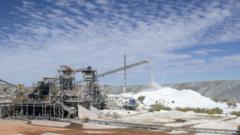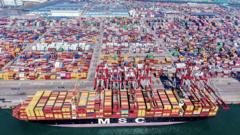The recent executive order signed by Trump to expedite deep-sea mining in U.S. and international waters has sparked criticism from China, which claims it contravenes international law. As the United States aims to enhance mineral access, environmentalists warn of significant ecological risks.
Controversy Surrounds Trump's Executive Order on Deep-Sea Mining Amid International Backlash

Controversy Surrounds Trump's Executive Order on Deep-Sea Mining Amid International Backlash
China's condemnation of Trump's executive order underscores tensions over seabed resource extraction and environmental concerns.
In a move to propel the United States into a leading position in global deep-sea mining, President Donald Trump has signed a contentious executive order aimed at facilitating exploration not only within U.S. waters but also in international territories. This ambitious directive has drawn sharp criticisms from China, which has voiced concerns that the order "violates" international law and disrupts consensus-building on a framework for seabed resource management.
According to the executive order, the U.S. seeks to establish itself as a pioneer in “responsible seabed mineral exploration,” part of a larger strategy to access critical minerals essential for sectors like aerospace and renewable energy. However, critics caution that the action notably circumvents ongoing United Nations negotiations regarding the governance of international waters.
The deep ocean is believed to harbor vast reserves of polymetallic nodules, rich in minerals such as cobalt and various rare earth elements. China, which holds a significant share of the global production of these critical resources, argues that the U.S. should not pursue unilateral actions that jeopardize the collective interests of the international community.
A spokesperson for the Chinese foreign ministry, Guo Jiakun, stated, “The U.S. authorization... violates international law and harms the overall interests of the international community.” Furthermore, U.S. officials have expressed determination to outpace China in securing these underwater resources, with estimates suggesting potential economic growth of $300 billion over the next decade and the creation of around 100,000 jobs through expanded mining initiatives.
Despite these potential benefits, environmental advocates and scientific bodies have voiced concerns about the ecological impact of deep-sea mining. They argue that it poses significant risks to marine ecosystems, particularly to organisms that inhabit delicate ocean layers. Jeff Watters from Ocean Conservancy called deep-sea mining a "deeply dangerous endeavour," asserting that the ramifications extend beyond the ocean floor and could jeopardize the health of the entire marine environment.
As discussions progress, one mining company, The Metals Company (TMC), is actively seeking permits to initiate operations and has expressed aspirations to commence mining by year-end. However, experts caution against potential detrimental outcomes. Historical data from experimental mining activities in the 1970s suggest complex and possibly long-lasting adverse effects on marine life, with some species failing to return due to the enduring absence of their habitat's polymetallic nodules, which take millions of years to regenerate.
As the debate over deep-sea mining intensifies, the ramifications of the U.S. executive order remain to be seen, with various stakeholders urging caution and advocating for thorough scientific evaluations before proceeding further into the deep.




















